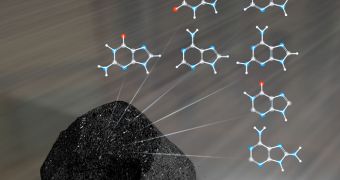A team of experts recently determined that some of the basic building blocks of deoxyribonucleic acid (DNA), the basic building blocks of life, may have originated in meteorites that were produced in space. This finding has tremendous implications for theories on the origins of life here on Earth.
The research lends additional credence to the theory of panspermia, which holds that the basic components of life were brought on our planet from space. That is not to say that life arrived here ready-made, but rather that it developed here because it met the appropriate conditions.
At the same time, researchers say, evidence of the building blocks of life being found in objects from outer space have been recovered starting decades ago. It could be that ready-made components of life were created inside stellar nurseries, and then ejected in the open Universe.
As such, these seeds of life could take root on any appropriate planet they find. The chances of that happening are rather slim, since astronomers looking for exoplanets have thus far failed to find an Earth analog among the 570+ extraterrestrial planets they identified.
“People have been discovering components of DNA in meteorites since the 1960's, but researchers were unsure whether they were really created in space or if instead they came from contamination by terrestrial life,” researcher Dr. Michael Callahan explains.
“For the first time, we have three lines of evidence that together give us confidence these DNA building blocks actually were created in space,” adds the expert, who is based at the NASA Goddard Space Flight Center (GSFC), in Greenbelt, Maryland.
Callahan is also the lead author of a new paper detailing the findings, which is published in the latest issue of the esteemed journal Proceedings of the National Academy of Sciences (PNAS).
What the study is suggesting is that the “innate” chemistry of comets and meteorites is capable of producing complex organic molecules. The case for life having emerged here on Earth from processes available billions of years ago is slowly beginning to deteriorate.
The research team was also able to determine that some space rocks are more adept at making this type of molecules than others. This discovery was made based on available meteorite samples found here.
“In fact, there seems to be a 'goldilocks' class of meteorite, the so-called CM2 meteorites, where conditions are just right to make more of these molecules,” Callahan goes on to say.
His team was also able to infer that the molecules were produced from non-biological reactions inside meteorites, or their asteroid parents.
“In the lab, an identical suite of nucleobases and nucleobase analogs were generated in non-biological chemical reactions containing hydrogen cyanide, ammonia, and water,” he explains.
“This provides a plausible mechanism for their synthesis in the asteroid parent bodies, and supports the notion that they are extraterrestrial,” Callahan concludes.

 14 DAY TRIAL //
14 DAY TRIAL //